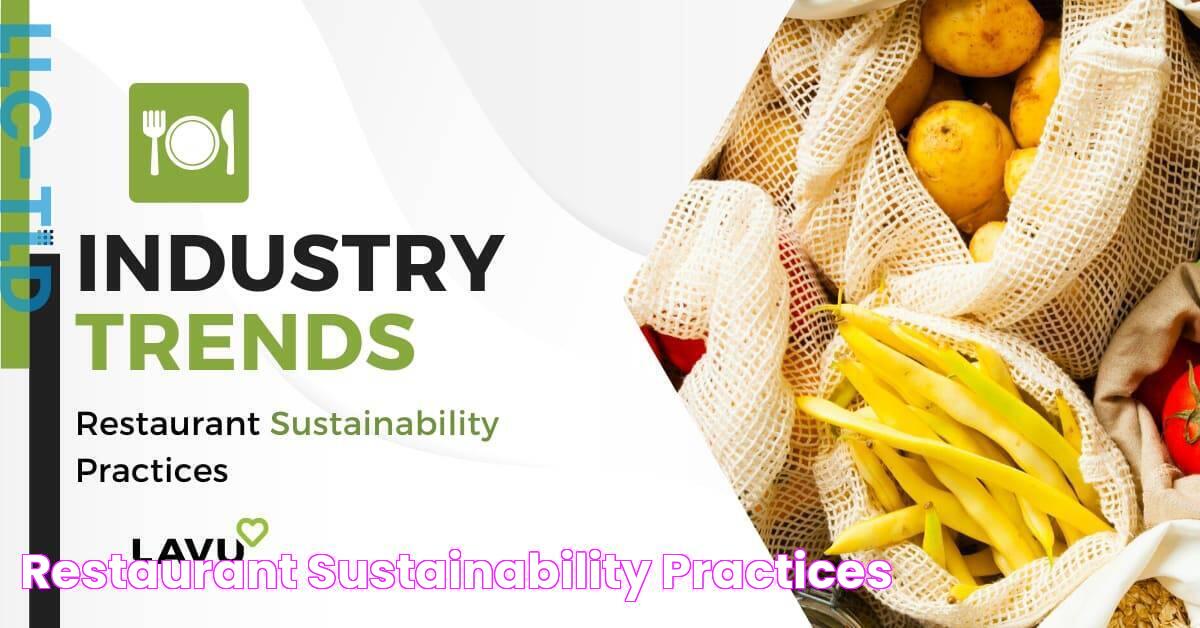Discover How Delis Can Embark On Sustainable Food Practices
Sustainable food practices in delis involve implementing environmentally friendly and socially responsible methods throughout the deli's operations, from sourcing ingredients to managing waste. These practices encompass various aspects such as using local and organic produce, reducing food waste, and adopting energy-efficient appliances.
Embracing sustainable food practices offers numerous benefits for delis. By supporting local farmers and reducing their carbon footprint, delis contribute to a more sustainable food system. Additionally, minimizing food waste not only benefits the environment but also helps delis save on costs. Furthermore, adopting sustainable practices can enhance a deli's reputation and attract customers who are increasingly seeking businesses that align with their values.
In this article, we will explore the various dimensions of sustainable food practices in delis, examining their importance, benefits, and challenges. We will also provide practical tips and case studies to help delis implement sustainable practices successfully.
Read also:Yellowstone Sarah Atwoods Shocking Death Stuns Fans
sustainable food practices in delis
Sustainable food practices in delis encompass a range of essential aspects, each playing a crucial role in creating a more environmentally friendly and socially responsible deli operation. These key aspects include:
- Sourcing: Prioritizing local and organic ingredients supports sustainable farming practices and reduces environmental impact.
- Waste Reduction: Implementing measures to minimize food waste, such as composting and donating surplus food, benefits the environment and saves costs.
- Energy Efficiency: Utilizing energy-efficient appliances and lighting systems reduces energy consumption and lowers operating costs.
- Packaging: Choosing sustainable packaging materials, such as biodegradable or reusable containers, helps reduce waste and promote environmental responsibility.
- Education: Educating staff and customers about sustainable practices fosters a culture of environmental awareness and encourages positive behavior change.
- Collaboration: Partnering with local organizations and businesses to support sustainable initiatives creates a positive impact within the community.
These aspects are interconnected and contribute to a comprehensive approach to sustainability in delis. By embracing these practices, delis can reduce their environmental footprint, support local economies, and meet the growing consumer demand for sustainable products and services.
1. Sourcing
Prioritizing local and organic ingredients is a fundamental aspect of sustainable food practices in delis. By sourcing ingredients from local farms and businesses, delis support sustainable farming practices that prioritize environmental stewardship and animal welfare. Local sourcing reduces transportation distances, minimizing greenhouse gas emissions and supporting local economies.
Organic ingredients are produced without the use of synthetic pesticides and fertilizers, which can harm ecosystems and contribute to pollution. Organic farming practices promote soil health, biodiversity, and water conservation. By choosing organic ingredients, delis contribute to a more sustainable agricultural system that protects the environment and promotes human health.
In addition to the environmental benefits, sourcing local and organic ingredients can enhance the quality and flavor of deli products. Local ingredients are often fresher and more flavorful, as they have not traveled long distances or been subjected to artificial ripening processes. Organic ingredients are also often grown using traditional methods that prioritize taste and nutritional value.
Delis that prioritize local and organic sourcing can differentiate themselves in the market and appeal to consumers who are increasingly seeking sustainable and high-quality food options. By embracing sustainable sourcing practices, delis can contribute to a more sustainable food system, support local farmers, and meet the growing demand for environmentally friendly products.
Read also:5 Tips To Make The Most Of Google Discovery For Your Oday
2. Waste Reduction
Waste reduction is a crucial component of sustainable food practices in delis. Food waste is a significant environmental problem, contributing to greenhouse gas emissions, water pollution, and soil degradation. By implementing measures to minimize food waste, delis can make a positive impact on the environment and save money.
Minimizing food waste in delis involves a range of strategies, including:
- Inventory management: Tracking inventory levels and using forecasting tools to optimize ordering and reduce spoilage.
- Portion control: Offering a variety of portion sizes to reduce plate waste.
- Composting: Diverting organic waste, such as food scraps and coffee grounds, from landfills to create a nutrient-rich soil amendment.
- Donating surplus food: Partnering with local food banks and shelters to donate surplus food that is still edible but may not be sold.
Composting and donating surplus food are particularly effective ways to reduce waste and support the community. Composting reduces the amount of organic waste sent to landfills, where it decomposes anaerobically, producing methane, a potent greenhouse gas. Donating surplus food helps to feed those in need and reduces the amount of food that goes to waste.
Delis that implement waste reduction measures can benefit from reduced operating costs, improved efficiency, and enhanced brand reputation. By reducing the amount of food waste they produce, delis can save on waste disposal costs and energy consumption. Waste reduction also helps delis to operate more efficiently, as they have less waste to manage and dispose of.
In conclusion, waste reduction is an essential aspect of sustainable food practices in delis. By implementing measures to minimize food waste, delis can reduce their environmental impact, save money, and support their communities. This not only benefits the deli's bottom line but also contributes to a more sustainable food system.
3. Energy Efficiency
Energy efficiency is a crucial aspect of sustainable food practices in delis. By utilizing energy-efficient appliances and lighting systems, delis can reduce their environmental impact and save money on operating costs.
- Reduced Greenhouse Gas Emissions: Energy-efficient appliances and lighting systems consume less energy, resulting in lower greenhouse gas emissions. This contributes to mitigating climate change and protecting the environment.
- Lower Operating Costs: Energy-efficient equipment uses less electricity, leading to reduced energy bills and lower operating costs for delis. This can improve profitability and free up resources for other sustainability initiatives.
- Improved Food Quality: Energy-efficient refrigerators and freezers maintain a consistent temperature, which helps preserve the quality and freshness of deli products. This reduces spoilage and waste, contributing to a more sustainable food system.
- Enhanced Customer Experience: Energy-efficient lighting systems create a more comfortable and inviting atmosphere for customers, enhancing their overall dining experience.
In conclusion, implementing energy-efficient practices in delis not only reduces environmental impact and lowers operating costs but also contributes to improved food quality and customer satisfaction. By embracing energy efficiency, delis can demonstrate their commitment to sustainability and create a more sustainable and profitable business.
4. Packaging
In the context of sustainable food practices in delis, packaging plays a crucial role in reducing waste and promoting environmental responsibility. Traditional packaging materials, such as single-use plastics and Styrofoam, contribute significantly to environmental pollution and waste. Sustainable packaging practices in delis involve choosing biodegradable or reusable materials that minimize environmental impact.
- Biodegradable Packaging: Biodegradable packaging materials, such as plant-based plastics and paper products, break down naturally in the environment, reducing landfill waste and pollution. By using biodegradable packaging, delis can contribute to a more circular and sustainable food system.
- Reusable Packaging: Reusable packaging, such as reusable containers and utensils, eliminates the need for single-use packaging and reduces waste generation. Delis can encourage customers to bring their own containers or offer reusable packaging options to minimize packaging waste.
- Reduced Packaging: Implementing measures to reduce packaging waste, such as optimizing packaging size and using package-free options for certain items, can significantly reduce the amount of packaging materials used.
- Customer Education: Educating customers about the importance of sustainable packaging and encouraging them to make informed choices can drive positive behavior change and support the adoption of sustainable packaging practices.
By embracing sustainable packaging practices, delis can reduce their environmental footprint, save money on waste disposal costs, and appeal to environmentally conscious consumers. Sustainable packaging is an essential aspect of sustainable food practices in delis, contributing to a more circular and environmentally friendly food system.
5. Education
Educating staff and customers about sustainable practices is a crucial component of sustainable food practices in delis. An informed and engaged workforce and customer base are essential for creating a culture of environmental awareness and encouraging positive behavior change throughout the deli's operations.
Staff education programs can cover a range of topics, including sustainable sourcing, waste reduction, energy efficiency, and sustainable packaging. By understanding the environmental and social impacts of their daily tasks, staff can make more informed decisions and contribute to the deli's sustainability goals. Customer education can take the form of signage, brochures, and social media campaigns that raise awareness about sustainable practices and encourage customers to make sustainable choices.
The practical significance of educating staff and customers about sustainable practices is immense. An informed workforce is more likely to implement sustainable practices consistently, reducing the deli's environmental footprint and operating costs. Educated customers are more likely to support businesses that prioritize sustainability and make purchasing decisions that align with their values. This can lead to increased customer loyalty and a positive reputation for the deli.
In conclusion, education is a fundamental pillar of sustainable food practices in delis. By investing in staff and customer education, delis can create a culture of environmental awareness, encourage positive behavior change, and reap the benefits of a more sustainable and profitable operation.
6. Collaboration
Collaboration is a vital component of sustainable food practices in delis. By partnering with local organizations and businesses, delis can create a positive impact within their communities and contribute to a more sustainable food system.
One important aspect of collaboration is supporting local farmers and producers. Delis can work with local farms to source fresh, seasonal ingredients, reducing transportation distances and supporting the local economy. They can also collaborate with local food banks and shelters to donate surplus food, reducing waste and helping to feed those in need.
Another important aspect of collaboration is partnering with organizations that promote sustainability. Delis can work with environmental groups to implement waste reduction programs, composting initiatives, and energy efficiency measures. They can also collaborate with local schools and community centers to educate customers about sustainable food practices.
The practical significance of collaboration for sustainable food practices in delis is immense. By working with local organizations and businesses, delis can reduce their environmental impact, support their communities, and create a more sustainable food system. This can lead to increased customer loyalty, a positive reputation, and a more profitable business.
In conclusion, collaboration is an essential pillar of sustainable food practices in delis. By partnering with local organizations and businesses, delis can create a positive impact within their communities and contribute to a more sustainable future.
FAQs on Sustainable Food Practices in Delis
Sustainable food practices in delis involve implementing environmentally friendly and socially responsible methods throughout deli operations, from sourcing ingredients to managing waste. Here are some frequently asked questions and answers about sustainable food practices in delis:
Question 1: Why are sustainable food practices important in delis?Sustainable food practices are important in delis because they help reduce environmental impact, support local economies, and meet growing consumer demand for sustainable products and services. By adopting sustainable practices, delis can differentiate themselves in the market and appeal to environmentally conscious consumers.
Question 2: What are some key aspects of sustainable food practices in delis?Key aspects of sustainable food practices in delis include sourcing local and organic ingredients, reducing food waste, adopting energy-efficient appliances, choosing sustainable packaging materials, educating staff and customers, and collaborating with local organizations and businesses.
Question 3: How can delis reduce food waste?Delis can reduce food waste through inventory management, portion control, composting, and donating surplus food to local food banks and shelters. Implementing these measures can help delis save money on waste disposal costs and energy consumption.
Question 4: What are the benefits of using energy-efficient appliances and lighting systems in delis?Using energy-efficient appliances and lighting systems in delis reduces energy consumption, lowers operating costs, improves food quality, and enhances the customer experience. By adopting energy-efficient practices, delis can demonstrate their commitment to sustainability and create a more sustainable and profitable business.
Question 5: How can delis choose sustainable packaging materials?Delis can choose sustainable packaging materials by opting for biodegradable packaging, reusable packaging, and reducing packaging waste. By embracing sustainable packaging practices, delis can reduce their environmental footprint, save money on waste disposal costs, and appeal to environmentally conscious consumers.
Question 6: Why is collaboration important for sustainable food practices in delis?Collaboration is important for sustainable food practices in delis because it allows delis to partner with local organizations and businesses to support sustainable initiatives, reduce their environmental impact, and create a positive impact within their communities. By working together, delis can create a more sustainable food system and contribute to a more sustainable future.
In summary, sustainable food practices in delis encompass a range of essential aspects that contribute to a more environmentally friendly and socially responsible deli operation. By adopting these practices, delis can reduce their environmental impact, support local economies, and meet the growing consumer demand for sustainable products and services.
Transition to the next article section: The following section will explore case studies of delis that have successfully implemented sustainable food practices, demonstrating the practical benefits and positive impacts of sustainability in the deli industry.
Tips for Sustainable Food Practices in Delis
Implementing sustainable food practices in delis requires a comprehensive approach that encompasses various aspects of operations. Here are five tips to guide delis in their journey towards sustainability:
Tip 1: Prioritize Local and Organic Sourcing
Sourcing ingredients from local farmers and opting for organic produce supports sustainable farming practices, reduces transportation distances, and enhances the quality and flavor of deli products.
Tip 2: Implement Waste Reduction Measures
Minimizing food waste through inventory management, portion control, composting, and donating surplus food reduces environmental impact, saves costs, and promotes a culture of sustainability within the deli.
Tip 3: Adopt Energy-Efficient Appliances and Lighting
Utilizing energy-efficient equipment and lighting systems reduces energy consumption, lowers operating costs, and contributes to a more sustainable and profitable business model.
Tip 4: Choose Sustainable Packaging Materials
Opting for biodegradable or reusable packaging materials reduces waste generation, minimizes environmental pollution, and appeals to environmentally conscious consumers.
Tip 5: Collaborate with Local Organizations
Partnering with local organizations, such as food banks and environmental groups, supports sustainable initiatives, reduces food waste, and creates a positive impact within the community.
Summary
By embracing these tips, delis can establish a sustainable and responsible operation that benefits the environment, supports local economies, and meets the growing demand for sustainable food options.
Transition to the article's conclusion
In conclusion, implementing sustainable food practices in delis requires a commitment to environmental stewardship and social responsibility. By adopting these tips, delis can create a more sustainable and profitable business while contributing to a more sustainable food system.
Conclusion
The exploration of sustainable food practices in delis has revealed their significance in reducing environmental impact, supporting local economies, and meeting consumer demand for sustainability. By implementing comprehensive measures that encompass sourcing, waste reduction, energy efficiency, packaging, education, and collaboration, delis can establish a sustainable and responsible operation.
Embracing sustainable practices not only benefits the environment but also enhances brand reputation, attracts environmentally conscious consumers, and contributes to a more sustainable food system. As the demand for sustainable options continues to grow, delis that prioritize sustainability will be well-positioned to thrive in the future.
Is Rob Zombie Really Married?
Uncover The Mystery: Draco Malfoy's True Identity Revealed
The Extraordinary Bond Of The Gibbons Twins: June And Jennifer


